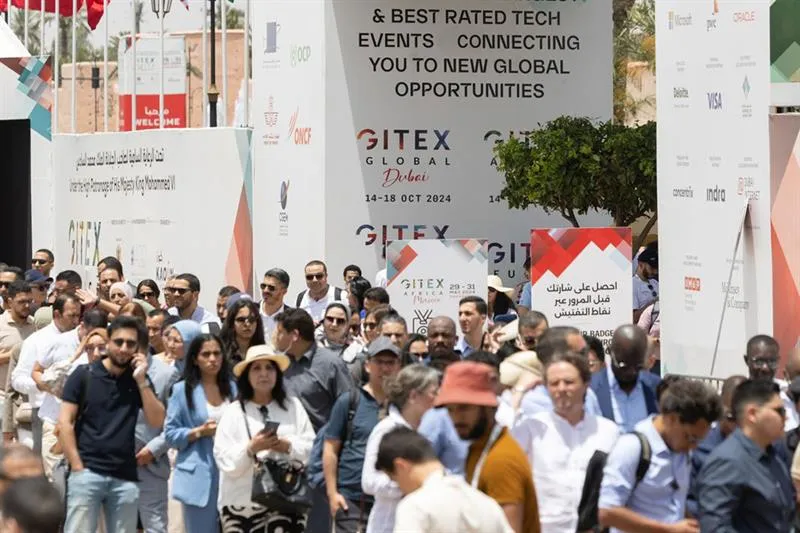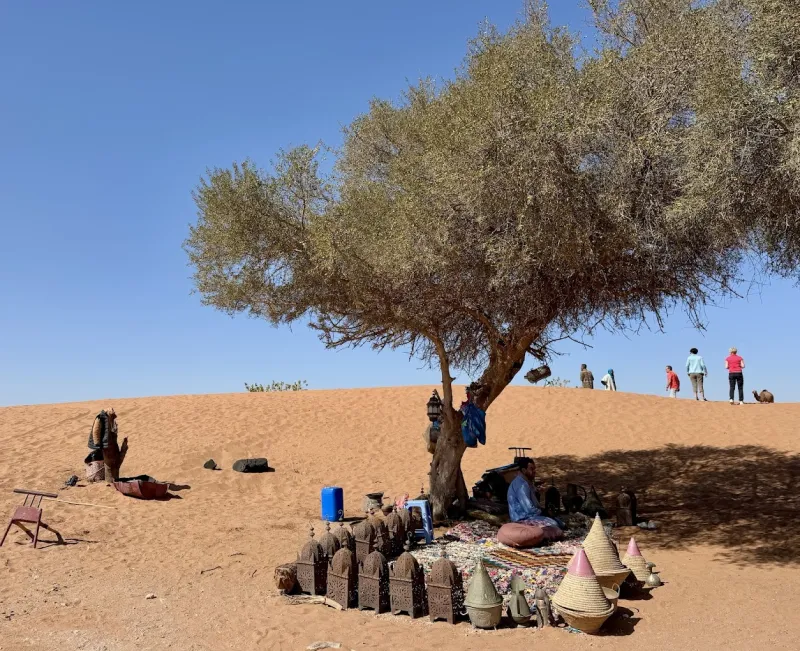The Magic of Moroccan Souks and Traditional Markets: A Journey into Authentic Commerce
14 مارس 2025Morocco is a sensory wonderland where every corner tells a story, and few places capture the country’s vibrant culture better than its souks and traditional markets. Bustling with life, color, and energy, these markets are much more than shopping destinations—they’re living museums that preserve centuries-old traditions and showcase the best of Moroccan craftsmanship. In this comprehensive guide, we delve into the magic of Moroccan souks, with a focus on famous markets like Souk El Had, and offer practical tips for bargaining, exploring local crafts, and immersing yourself in the authentic shopping experience.
The Heartbeat of Morocco: An Introduction to the Souks
What Are Souks?
In Morocco, the term “souk” refers to a traditional market that has been the center of commerce and community life for centuries. These marketplaces are more than places to buy and sell goods—they are dynamic social hubs where local culture, art, and traditions come alive.
Cultural Melting Pots: Souks are where local residents and visitors meet, exchange stories, and experience the vibrant rhythms of daily Moroccan life.
Historical Legacy: Many souks have existed for generations, with stalls passed down through families, preserving ancient techniques in crafts such as pottery, weaving, metalwork, and more.
Diverse Offerings: From handmade carpets and intricate jewelry to aromatic spices and fresh produce, every souk is a treasure trove of unique items that reflect the region’s cultural heritage.
The Allure of Traditional Markets
What makes Moroccan markets so captivating is their ability to transport you back in time. As you wander through narrow alleys lined with colorful stalls, you become part of a timeless ritual—one that has evolved slowly over centuries, yet remains rooted in authenticity.
A Feast for the Senses: The vivid hues of textiles, the aromatic scents of spices and mint tea, and the rhythmic sounds of haggling and traditional music create an immersive sensory experience.
Local Interaction: Engaging directly with local artisans and vendors provides insights into the art of traditional craftsmanship and the cultural significance behind each product.
Authentic Shopping: Unlike modern shopping malls, Moroccan souks offer a personalized and interactive experience, where every purchase comes with a story and a connection to the community.
Spotlight on Souk El Had: A Must-Visit Market
The Vibrancy of Souk El Had
One of the most renowned traditional markets in Morocco, Souk El Had, exemplifies the magic of these bustling hubs. Whether it’s held weekly or is a permanent fixture in a city, Souk El Had is often the heartbeat of the local community.
Diverse Products: Here, you can find everything from handcrafted ceramics and silver jewelry to spices, textiles, and fresh produce. The market is known for its wide range of products that cater to both everyday needs and unique souvenirs.
Historical Atmosphere: Walking through Souk El Had, you’ll notice the time-honored methods of trade—vendors greet you with warm smiles and engage in friendly banter, while traditional techniques in craft production continue unabated.
Local Favorites: Souk El Had is a favorite not only among locals but also with tourists who seek an authentic glimpse into Moroccan daily life. Its lively atmosphere, combined with the rich variety of goods, makes every visit a unique adventure.
Tips for Navigating Souk El Had
Exploring a bustling market like Souk El Had can be both exhilarating and overwhelming. Here are some tips to help you make the most of your visit:
Go Early: Arriving early allows you to see the market at its freshest and with fewer crowds. Early hours also give you the best selection of goods.
Wear Comfortable Clothing: The narrow alleys and uneven pathways call for comfortable shoes and light, breathable clothing. A hat and sunglasses are also useful for sunny days.
Keep an Open Mind: Souks are a maze of sensory delights and unexpected finds. Allow yourself time to wander without a strict agenda—sometimes, the best treasures are found by simply exploring.
Learn Basic Phrases: A few words in Arabic or Berber can go a long way in establishing rapport with vendors and showing respect for local culture.
Stay Hydrated: Carry a bottle of water or enjoy a refreshing glass of mint tea from one of the local stalls to keep your energy up while you shop.
Mastering the Art of Bargaining
The Bargaining Culture
Bargaining is not just a way to negotiate prices—it’s a cultural ritual deeply embedded in the souk experience. Haggling is expected and can be an enjoyable, interactive process that brings you closer to the local way of life.
Start Low: Begin by offering a price lower than the asking price, leaving room for negotiation. Vendors expect counteroffers, so this initial lowball is part of the game.
Be Polite and Friendly: A warm smile, a respectful tone, and a bit of humor can work wonders. Vendors appreciate genuine interactions, which can lead to better deals and even personal recommendations.
Know the Value: Do a bit of research before you go—understanding the typical price range for the items you’re interested in will help you negotiate confidently.
Walk Away Tactfully: If negotiations aren’t going your way, don’t be afraid to walk away. Vendors may call you back with a better offer if they sense you’re serious about your purchase.
Embracing the Bargain
Remember that the goal of bargaining is not just to save money but also to engage in a cultural exchange. Each negotiation is an opportunity to learn about the local business practices and to build a connection with the vendor.
The Treasure Trove of Local Crafts
Discovering Traditional Artistry
Moroccan souks are renowned for their diverse range of traditional crafts that have been perfected over centuries. These artisanal products are not only beautiful but also steeped in history and cultural significance.
Handwoven Textiles: From vibrant rugs and kilims to intricately embroidered garments, Moroccan textiles are a feast for the eyes. Each piece reflects regional styles and techniques passed down through generations.
Ceramics and Pottery: Moroccan ceramics, often adorned with geometric patterns and bold colors, are crafted with precision and care. Cities like Fes and Safi are famous for their distinctive pottery styles.
Jewelry and Metalwork: The delicate silver jewelry and ornate lanterns crafted by local artisans are a testament to Morocco’s rich heritage in metalwork. These items are not only decorative but also carry symbolic meanings.
Leather Goods: Traditional leather products, such as babouches (traditional slippers), bags, and belts, are made using centuries-old tanning methods that produce soft, durable, and beautifully patterned leather.
Supporting Local Artisans
When you purchase a handcrafted item from a Moroccan souk, you’re not just buying a souvenir—you’re supporting a local tradition and contributing to the sustainability of age-old crafts. Look for items that are marked as handmade and ask the vendor about the history or technique behind the product. This small interaction can enrich your understanding of the item’s value and authenticity.
Immersive Shopping Experiences: Beyond the Transaction
Cultural Workshops and Demonstrations
Many Moroccan markets offer more than just products—they provide immersive experiences that allow you to witness the art of traditional craftsmanship firsthand.
Live Demonstrations: In some souks, you can watch artisans at work as they weave carpets, mold ceramics, or create intricate metalwork. These live demonstrations offer a deeper appreciation of the skills and effort involved in making each piece.
Workshops and Classes: For those eager to learn, some markets and local organizations offer workshops on traditional crafts. Whether it’s a pottery class or a textile weaving session, these experiences provide a hands-on insight into Morocco’s rich cultural traditions.
Culinary Delights in the Souk
No visit to a Moroccan souk is complete without sampling the local cuisine. Food stalls and street vendors offer an array of delectable treats that capture the essence of Moroccan flavors.
Fresh Mint Tea: Often served as a gesture of hospitality, mint tea is a must-try. Its refreshing aroma and sweet taste provide the perfect complement to your shopping adventure.
Local Snacks: Savor traditional street foods such as msemen (flaky pancakes), briouats (savory pastries), and freshly baked bread. Each bite is a taste of Morocco’s culinary heritage.
Spice Markets: Wander through spice stalls where the air is rich with the scents of cumin, saffron, paprika, and other aromatic herbs. Purchasing a few spices not only enhances your culinary adventures at home but also connects you to Morocco’s historic spice trade.
Practical Tips for a Successful Souk Visit
Planning Your Trip
Do Your Homework: Research the specific souk you plan to visit, its operating hours, and any local customs. Knowing a bit about the market’s history and specialties can enhance your overall experience.
Budget Accordingly: Set a budget for your shopping, but also be open to the unexpected bargains and unique finds that may come your way.
Travel Light: Carry a comfortable bag for your purchases and be prepared to walk a lot, as souks are often spread out over winding streets and alleys.
Stay Alert: As with any busy marketplace, keep an eye on your belongings. It’s easy to get lost in the excitement, so be mindful of your personal items.
Engaging with the Locals
Building rapport with local vendors can enrich your experience:
Exchange Stories: Take a moment to ask vendors about the origins of their crafts or the history behind certain items. Many are proud of their heritage and happy to share insights.
Learn Key Phrases: Simple greetings and expressions in Arabic or Berber can go a long way in establishing trust and respect.
Show Appreciation: Even if you don’t end up purchasing an item, expressing genuine appreciation for the craft and the vendor’s work helps foster a positive, memorable interaction.
The Enduring Charm of Moroccan Markets
The magic of Moroccan souks lies in their ability to offer an authentic window into a world where commerce, culture, and community converge. Each visit is a journey through time—a celebration of tradition, art, and the human connection that binds a community together. From the bustling corridors of Souk El Had to the quiet corners of lesser-known markets, Morocco invites you to explore, negotiate, and savor every moment of your shopping adventure.
Why Visit a Moroccan Souk?
Authenticity: Experience the genuine heart of Moroccan culture and take home not just souvenirs, but stories and memories.
Cultural Connection: Every interaction in a souk is an opportunity to learn about the local way of life and to appreciate the rich heritage of the region.
Unforgettable Experiences: Whether you’re bargaining for a handmade rug or sipping mint tea with a local artisan, the souk experience is deeply personal and transformative.
Conclusion
Moroccan souks and traditional markets are more than just places to shop—they are vibrant cultural landscapes where history, art, and community come together in a dynamic and ever-changing mosaic. From the famed Souk El Had to countless hidden market gems, each souk offers a unique narrative of Morocco’s rich traditions, where the art of bargaining, the beauty of handmade crafts, and the warmth of local hospitality create an unforgettable experience.
Whether you’re a seasoned traveler or a curious explorer eager to dive into authentic Moroccan life, the magic of the souks awaits you. Embrace the lively atmosphere, engage with local artisans, and let the enchanting rhythm of the market transport you to a world where every item has a story and every corner exudes timeless charm.
Plan your visit to Morocco’s souks, and discover for yourself why these traditional markets remain at the heart of the country’s cultural and social life. Immerse yourself in the magic, savor the flavors, and take home not just treasures, but a piece of Morocco’s enduring soul.
Embark on a journey through Morocco’s bustling souks and traditional markets—where every transaction is a celebration of heritage, every bargain a shared story, and every item a testament to the art of living. Discover the magic that awaits in the heart of Moroccan commerce, and let the souk experience enrich your travel adventure!
Hi, I'm Camila Elise. I'm a passionate writer and design enthusiast at rents.ma, blending modern insights with the timeless elegance of Moroccan culture. Join me as I explore innovative ideas to transform your living space into a true reflection of your style.




